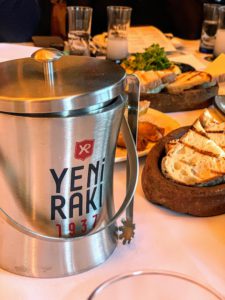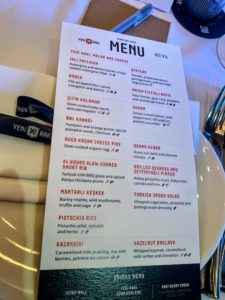With World Raki Week just around the corner, Nick gets schooled on the legendary drink
Some of us who have been to Turkey on holiday have had a glass or three of Raki. Not all of us have woken up, as I did the next day, in a storm drain, but I was young and foolish.

The potent aniseed potion that’s national drink of Turkey is not entirely dissimilar to pastis, ouzo, sambuca, arak and aguardiente, and it has probably been around since the 11th century.
It’s often called aslan sütü (lion’s milk) because of the white colour it turns when water is added, and possibly because of the courage it gives the drinker. Like its sibling anise spirits, it’s never drunk neat instead 50-50 raki to water is the norm with often an ice cube added.
Although as I arrive at Rüya Turkish Restaurant London I am handed a cocktail called Istan-Bull, a concoction made with Yeni Raki . It’s deliciously different, the anise notes tempered by ginger while cucumber slices are cool and refreshing.
Raki expert, Ayça, from Yeni Raki is on hand, along with drinks sage / host Douglas Blyde, to explain a bit more about the drink before we go eat. The first thing I learned is that not all Rakis are the same, some are made from raisins while others use fresh grapes.
She tells me that Yeni Rakı is raisin based, while fresh grape rakı is more like ouzo, but stronger. Yeni Rakı is probably the most popular brand in Turkey, it’s been rated as the #1 Raki brand worldwide for over sixty years. Raki itself extends back to Anatolia in around 2000 B.C.

Raki, which is technically a sweet, clear brandy, is made from a distilled grape spirit called suma to a whopping 94.55% abv.This is then mixed with highly rectified spirit, watered down, and then re-distilled with Aniseed -Pimpinella Anisum – which is Latin and not the name of the latest Notting Hill nepo baby.
The distillate is then further diluted to around 45% abv and some sugar from sugar beets is added before it’s left for a minimum of thirty days to allow the flavours to come together. Yeni Raki is always made in the traditional way
You can drink Raki anytime but it’s particularly good drunk along with a meal of mezes, so we head into Rüya’s private dining room to do just that. As Ayça explains, you drink your raki slowly, sipping between bites. It’s all about friendship, relaxing and sitting together socially to chat about everything from politics to reality TV.
And that’s what we did, as dish after delicious dish emerged from the magical kitchens of Rüya’s head chef Halit Deniz.. I counted sixteen dishes in all, although the raki did eventually affect my counting. All were great, some were particularly unusual, such as oysters with tomato, preserved lemon pomegranate and a Yeni Raki mignonette.
Others, such as the superb fresh-baked in house cheese Pide with a slow cooked organic egg were wonderfully traditional. While 24 hours slow cooked short rib, with a Turkish chilli BBQ glaze and spiced chickpea puree, added some serious weight.
Night had fallen by the time I left Rüya but I was still upright, albeit now with the gentle, seductive, aroma of anise about my person as I tried to find the tube station, while carefully avoiding any storm drains.
YeniRakiGlobal.com
World Rakı Week by Yeni Rakı starts in London on December 4th with an array of events to celebrate rakı culture. Immerse yourself in the spirit of traditional Turkish ‘meyhane’ nights with live music, master the art of cocktail crafting at one of the workshops or go on a culinary journey with renowned food & drink journalists.
On Friday 8th, you can indulge in the very same Raki experience as I did. Limited tickets are available for £50 here, along with details of all the other Raki-fuelled events.
